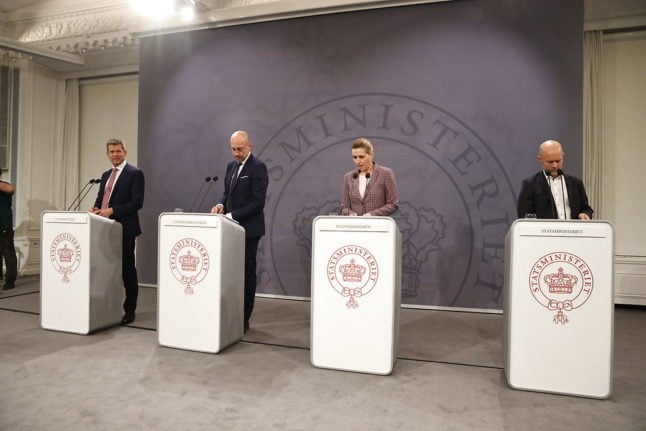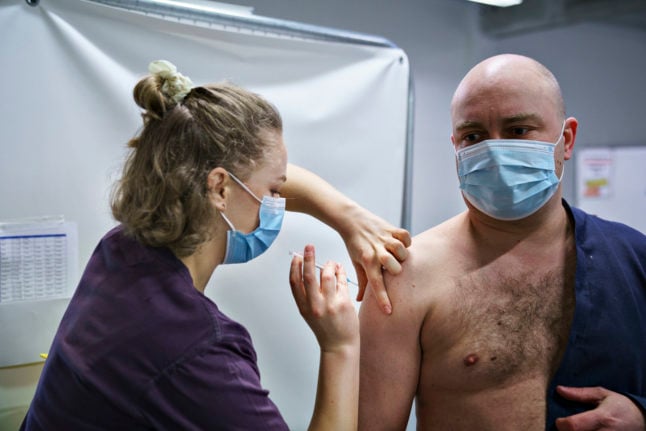The government supports upgrading Covid-19 to the status of “critical threat to society” on Monday evening, in a step which allows restrictions to be introduced. This would pave the way for the return of the coronapas.
In a briefing, Prime Minister Mette Frederiksen confirmed the government wants to reintroduce requirements to show a valid coronapas at bars and restaurants and to attend some events in Denmark. Coronapas requirements were lifted in September after being originally introduced in the spring.
“We cannot let the virus run wild in Denmark,” Frederiksen said.
Health Minister Magnus Heunicke confirmed a valid coronapas would be needed at nightclubs, cafes, on party buses and at indoors venues where food and drink are served.
The health pass will also be required at indoor events with over 200 spectators and outdoors events with over 2,000 spectators.
Frederiksen also called for more people in Denmark to get vaccinated against Covid-19.
“It can’t be said clearly enough. Those of you who are not yet been vaccinated: do so,” she said.
“For all of you who are not vaccinated, (things) are going to become more difficult. And that’s also how I think it should be,” she added.
Denmark currently has a Covid-19 vaccination rate of just over 75 percent.
The coronapas is used to document a recent negative Covid-19 test or immunity against the virus due to vaccination or recent recovery from infection.
The period for which earlier infection can form the basis for a valid coronapas will be reduced from 12 months to 6 months, Heunicke said during the briefing.
Rules requiring the pass will apply to those over the age of 15, in a change from the earlier minimum age of 16.
The government’s advisory Epidemic Commission earlier on Monday recommended the change of status of Covid-19 from “infectious disease” to a “critical threat” to society. That is a reversal of the move in September, when earlier restrictions were lifted.
The government confirmed through Monday’s briefing that it agrees with the recommendation of the Commission.
Danish law now requires an epidemic to have the status of a critical threat to society for the government to be able to introduce restrictions like face mask mandates, assembly limits and lockdowns, as well as coronapas requirements.
A majority in parliament must not oppose the government’s position in order for the heightened threat level to come into effect. In practice, this means the parliamentary epidemic committee (udvalg in Danish, not to be confused with the commission, kommission) must back the move.
The parliamentary committee includes representation from all parties, and a majority must support any change. That committee is to address the issue at a meeting on Tuesday.
Some conservative parties earlier expressed reservations about making Covid-19 again a “critical threat”, opening the door to restrictions. It is unclear at the time of writing whether a majority currently supports making the change.
Clamour for the return of some measures against the virus in Denmark has grown in November as infection numbers have risen.
Experts last week called for the reintroduction of the health pass, along with the use of facemasks, as a way to reduce infections “here and now”. The director of the Danish Health Authority Søren Brostrøm on Friday called for politicians to reintroduce the coronapas.
READ ALSO:
- How likely is the return of Covid-19 restrictions in Denmark?
- Danish health minister says more vaccinations needed to avoid return of restrictions
Monday saw the fifth consecutive day with over 2,000 new cases of Covid-19 in Denmark. 2,294 people tested positive from 102,000 PCR tests, a test positivity rate of 2.25 percent.
Over 300 people are now admitted to Danish hospitals with the virus after that total rose to 303 on Monday. That is the highest number since February 15th.
Heunicke said during the briefing that the number of hospitalised Covid-19 patients had further increased to 313 during Monday.



 Please whitelist us to continue reading.
Please whitelist us to continue reading.
Member comments